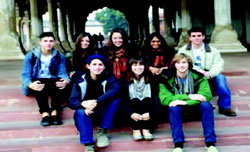Governor Chris Christie recently sparked a controversy because of a comment he made during his announcement for a voter referendum on same sex marriage in New Jersey. Stating citizens should decide on the issue and not the state legislature, Christie added “I think people would have been happy to have a referendum on civil-rights rather than fighting and dying in the streets in the South.”
While Christie has received flack for wanting to put the issue on a ballot, his comment has received much more backlash from both state politicians like Newark Mayor Cory Booker, former New Jersey governors, and other African-American figures like civil-rights leader and U.S. House representative John Lewis.
Hettie Williams, a lecturer of African American History said the statement “was not grounded in historical context,” as African American’s rights were violated through statutes passed by local and state governments “that led to the rise of segregation sanctioned by the Supreme Court.”
“African Americans who attempted to vote or exercise their rights as citizens were routinely harassed, raped, beaten, and lynched,” said Williams. “The Civil Rights Movement was a reaction to the violence leveled against African Americans despite amendments to the U.S. Constitution.”
Dr. Nancy Mezey, director of the sociology program, is not surprised that Christie’s comment was criticized and thinks they should be critical, as his statement was “based on ignorance on a time when a public referendum on civil rights would not have ended in favor of equal rights for African Americans.”
“Christie not only holds a public office in which he should be advocating for all of his constituents, but he is also held in high regard by Republicans throughout the U.S.,” said Dr. Mezey, “He has a responsibility to make well informed comments and choices.”
Christie has made some controversial remarks in the past that haven’t sat well with both rivals and supporters, including telling a citizen that it was “none of her business” where his kids went to school, or telling a crowd that the “Sharia Law business is crap,” and he was “tired of dealing with the crazies” after appointing a Muslim judge to a state bench.
According to Williams, all public officials should be held to a higher standard as “they should at the least have a basic understanding of U.S. history.”
“It is not possible to understand the present without knowledge of the past,” said Williams. “The beatings, rapes, and lynching of African-Americans are well documented.”
Although the comment is still causing an impact for Christie and his reelection in 2013, Mezey is not sure the “comment will hurt him in the long run.”
“Americans seem to have a very short political memory,” said Mezey. “If the citizens of New Jersey think that Christie has done a good job overall during his tenure as governor, then they will disregard his comment.”
Christie tried clarifying his statements a week afterwards in an attempt to calm his critics, saying the “political climate” during the civil rights movement “didn’t give them a chance for a referendum.” He also called NJ Assemblyman Reed Gusciora “numb-nuts” for comparing him to segregationists like late governor of Alabama George Wallace.
“Christie’s comment suggests that Americans would have affirmed the civil rights of African Americans,” said Dr. Katherine Parkin, an associate professor of history. “But it was the compassion borne of witnessing the injustice of young women and men being harassed, imprisoned, beaten, and killed that allowed white Americans to concede that they would have to share the power their skin emboldened them with at that time.”
Christie eventually apologized, a day after trying to explain his statement, saying sorry to anyone he “somehow offended” after his original statement “wasn’t clear enough” and was left “open to misinterpretation.”
Dr. Parkin thinks based off his temperament Christie doesn’t spend a lot of time apologizing so he was aware that he alienated African American voters, gay voters and many others.
“Everyone says things they don’t intend, but in this case Christie actually said exactly what he meant, gay marriage should be put to a vote,” said Dr. Parkin. “He said it while acknowledging that it is a civil right.”
Christie has now switched gears from defending this comment to defending his decision to put the same sex marriage issue on the ballot.
“Christie was just commended by Garden State Equality, New Jersey’s most active and vocal LGBT rights activist groups, for appointing Bruce Harris to the New Jersey Supreme Court,” said Mezey. “If approved, Harris will become the first openly gay person, and the third African-American, to serve on the New Jersey Supreme Court. So perhaps Gov. Christie’s actions will speak louder than his words.”




